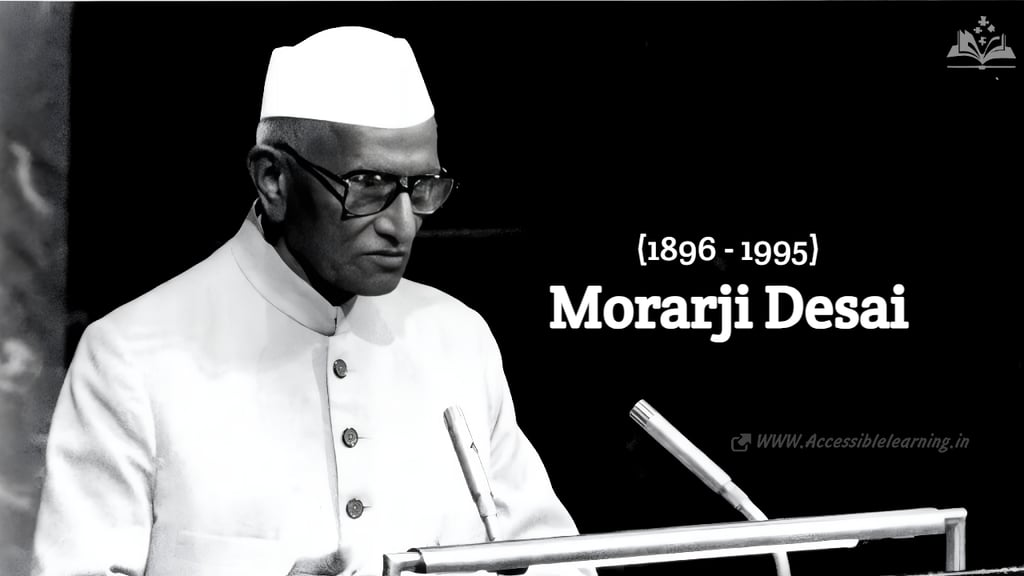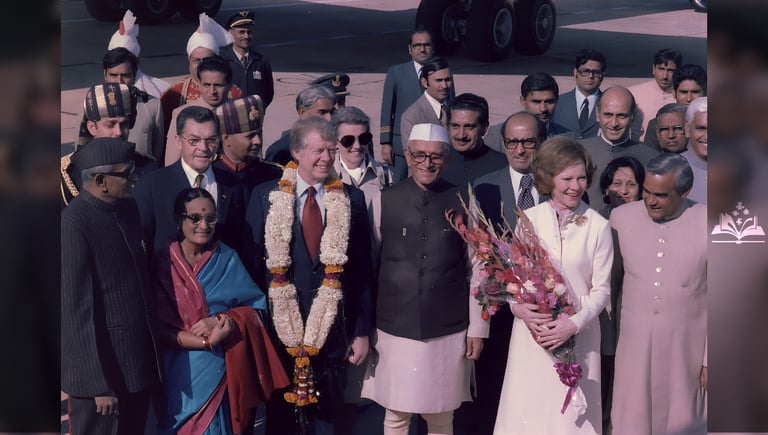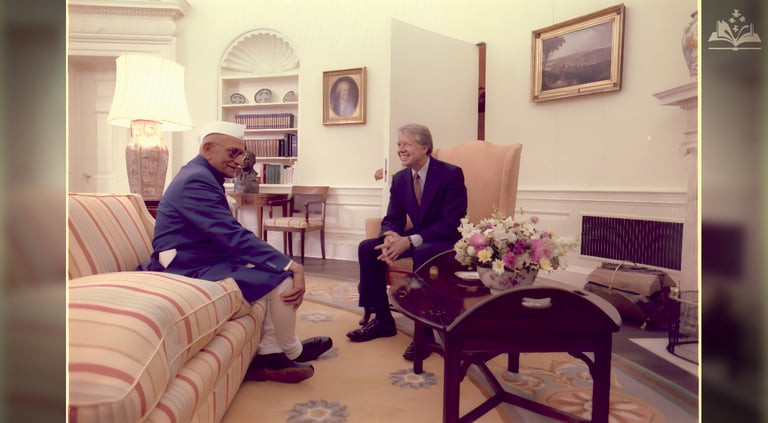
Morarji Desai: India's Principled Prime Minister and Freedom Fighter
Explore the extraordinary life and enduring legacy of Morarji Desai, India's principled Prime Minister whose journey from freedom fighter to national leader exemplifies integrity in public service. This comprehensive profile examines his political contributions, Gandhian values, and continued relevance in contemporary governance.
BIOGRAPHY/HISTORYINDIA/BHARATPOLITICAL JOURNEY
Keshav Jha
5/13/202511 min read


Morarji Desai stands as one of India's most distinctive and principled political leaders. A stalwart of India's freedom movement who later rose to become the country's Prime Minister, Desai's life journey reflects the evolution of modern India itself. Known for his unwavering integrity, austere lifestyle, and controversial health practices, Desai left an indelible mark on Indian politics through his commitment to Gandhian principles and economic conservatism. His remarkable career spanned nearly seven decades, during which he witnessed and shaped critical events in India's transition from colonial rule to a sovereign democratic republic.
Early Life and Education
Born on February 29, 1896, in Bhadeli village in Gujarat, Morarji Desai grew up in a middle-class family with strong values. His father, Ranchhodji Desai, worked as a teacher, instilling in young Morarji the importance of education and discipline. His mother, Vajiaben, was a deeply religious woman who influenced Desai's spiritual outlook. Growing up in the culturally rich environment of Gujarat, Desai absorbed both traditional values and progressive ideas that were beginning to transform Indian society.
After completing his early education locally, Desai pursued higher studies and earned a Bachelor of Arts degree from Wilson College in Mumbai (then Bombay) in 1918. During his college years, he developed an interest in politics and social reform, influenced by the growing nationalist sentiment in India. His academic performance was exemplary, showcasing the discipline and analytical thinking that would later characterize his political approach.
Rather than pursuing further academic credentials, Desai chose to enter public service, beginning his career as a civil servant in the Bombay Presidency during British colonial rule. Starting as a deputy collector in 1918, he quickly impressed his superiors with his administrative acumen and unwavering honesty. By 1930, he had risen to the position of Deputy Collector of Godhra, a significant achievement for an Indian in the colonial administration.
Joining the Freedom Movement
Initially, Desai was content working within the British administrative framework. However, the growing independence movement and the powerful influence of Mahatma Gandhi's non-violent resistance philosophy gradually transformed his outlook. A pivotal moment came when he witnessed the brutal suppression of peaceful protestors during the Civil Disobedience Movement. By 1930, Desai made the significant decision to resign from his secure government position to join India's struggle for independence.
His participation in the Civil Disobedience Movement and subsequent freedom struggles resulted in multiple imprisonments. Between 1930 and 1947, Desai was imprisoned nine times, spending a total of nearly seven years in British jails. During these periods of incarceration, he studied religious texts extensively, particularly the Bhagavad Gita, which deepened his spiritual convictions and reinforced his commitment to truth and non-violence. These formative experiences shaped his political ideology and personal character, establishing him as a disciplined, principled leader who prioritized integrity above political expediency.
Desai's relationship with Gandhi was particularly influential. He embraced Gandhi's principles of satyagraha (passive resistance), ahimsa (non-violence), and swadeshi (self-reliance). During the Quit India Movement of 1942, Desai emerged as a prominent leader, organizing civil disobedience in Gujarat and inspiring countless others to join the independence struggle.


Political Career After Independence
Following India's independence in 1947, Desai's administrative experience and reputation for integrity made him a natural choice for leadership positions in the newly formed government.
Chief Minister of Bombay State (1952-1956)
As Chief Minister, Desai focused on administrative reforms, rural development, and educational expansion. He implemented land reforms that benefited small farmers and established numerous educational institutions. His administration was marked by fiscal discipline and anti-corruption measures that set new standards for governance. During this period, he also handled the sensitive issue of linguistic reorganization, navigating the demands for separate Gujarati- and Marathi-speaking states with political acumen.
Finance Minister in Prime Minister Nehru's cabinet (1958-1963)
As Finance Minister, Desai introduced stringent economic measures that strengthened India's financial foundation during its critical early years. He maintained tight control over government expenditure, instituted tax reforms to boost revenue, and promoted savings among citizens. His annual budgets were characterized by pragmatic financial planning rather than populist measures. Desai's economic philosophy emphasized self-reliance, minimal foreign debt, and building robust domestic industries—policies that helped establish India's economic sovereignty in the post-colonial era.
Deputy Prime Minister under Indira Gandhi (1967-1969)
In this role, Desai oversaw multiple ministries, including Finance, Home Affairs, and Planning. However, ideological differences with Prime Minister Indira Gandhi soon emerged. Desai advocated for market-oriented economic reforms and fiscal prudence, while Gandhi increasingly favored socialist policies and populist measures. The conflict culminated in 1969 when Gandhi nationalized major banks against Desai's advice, leading to a split in the Congress Party. Desai joined the Congress (O) faction, beginning his journey as an opposition leader.
The Split in Congress & Formation of Opposition
The 1969 split in the Congress Party represented a significant turning point in Indian politics and in Desai's career. As a member of Congress (O) (Organization), Desai became a vocal critic of Indira Gandhi's leftist policies and increasing autocratic tendencies. During this period, he refined his political philosophy, advocating for what he called "Gandhian socialism"—an approach that balanced free market principles with social welfare goals while emphasizing ethical governance.
Between 1969 and 1975, Desai built alliances with other opposition parties, including the Swatantra Party, Jana Sangh, and Socialist Party. He became a respected elder statesman of the opposition, known for his articulate critiques of government policies in Parliament. His speeches during this period focused on economic mismanagement, growing corruption, and the erosion of democratic institutions under Gandhi's leadership.
Opposition to Emergency Rule
Perhaps the most defining moment in Desai's political career came during India's Emergency period (1975-1977). When Prime Minister Indira Gandhi suspended democratic processes and civil liberties, Desai emerged as one of her strongest critics. Despite being in his late 70s, he was imprisoned along with other opposition leaders.
During his 19-month imprisonment, Desai maintained his disciplined lifestyle, spending hours in meditation and writing. He refused special treatment and lived as an ordinary prisoner, enhancing his moral authority among both political colleagues and the public. Even under duress, he consistently advocated for nonviolent resistance to the Emergency, rejecting calls for more radical action.
Upon his release in January 1977, when Indira Gandhi surprisingly called for elections, Desai played a crucial role in uniting opposition parties under the Janata Party banner. His stature as a freedom fighter and principled opponent of authoritarianism made him a natural leader of this diverse coalition. The subsequent election campaign focused on restoring democracy and constitutional rights, with Desai's personal narrative of imprisonment resonating powerfully with voters.
Following the Emergency's end and subsequent elections, Desai led the newly formed Janata Party to a historic victory, defeating Indira Gandhi's Congress Party. At 81, he became India's first non-Congress Prime Minister, heading a coalition government from 1977 to 1979.


Prime Ministership (1977-1979)
Desai's government faced the enormous challenge of restoring democratic norms while managing a diverse coalition of parties with differing ideologies. His administration focused on several key areas:
Constitutional Reforms
Under Desai's leadership, the government introduced the 44th Amendment to the Constitution, which curtailed emergency powers, restored fundamental rights, and strengthened judicial independence. These reforms represented essential safeguards against future authoritarian tendencies and remain important constitutional protections today.
Economic Policies
True to his fiscally conservative principles, Desai implemented anti-inflationary measures, reduced government expenditure, and emphasized agricultural development. His administration lowered taxes on essential commodities, reduced import restrictions on industrial goods, and encouraged private sector participation in the economy. These policies helped stabilize prices and improve economic growth rates that had stagnated during the Emergency.
Foreign Policy Initiatives
Desai significantly reshaped India's foreign policy, advocating for "genuine non-alignment" rather than what he perceived as pro-Soviet tendencies under previous governments. His administration:
Normalized relations with China after decades of tension
Improved ties with the United States and Western democracies
Established better relations with neighboring countries, especially Pakistan
Advocated strongly for global nuclear disarmament
His "open diplomacy" approach represented a departure from the secretive foreign policy practices of previous governments. Notably, Desai's personal communication with Pakistan's General Zia-ul-Haq led to improved bilateral relations, earning him respect internationally as a peacemaker.
Anti-Corruption Measures
Drawing on his reputation for personal integrity, Desai initiated several anti-corruption measures, including
The establishment of special courts to try corruption cases
Legislative reforms to enhance transparency in government contracts
Requirements for public officials to declare their assets
Investigations into allegations of corruption during the Emergency period
These initiatives, while not always successful due to political resistance, established important precedents for accountability in public life.
Administrative Reforms
Desai implemented significant administrative reforms aimed at improving governance efficiency and reducing bureaucratic delays. His government established the Second Administrative Reforms Commission, which recommended streamlining government procedures, decentralizing authority, and enhancing citizen access to public services.
Internal Challenges and Government Collapse
Despite these achievements, Desai's government faced significant internal challenges. The Janata Party was a coalition of parties with diverse ideologies, ranging from right-wing Hindu nationalists to socialists. Personal rivalries among senior leaders, particularly between Charan Singh and Desai, created instability.
Policy disagreements emerged over economic direction, with some coalition partners advocating for more socialist policies while Desai maintained his market-oriented approach. Additionally, the legacy issue of dual membership—whether Janata Party members could simultaneously belong to the Hindu nationalist organization RSS—created deep divisions.
By July 1979, these tensions culminated in Charan Singh withdrawing support from the government with the backing of Indira Gandhi's Congress Party. Desai resigned rather than heading a minority government, bringing an end to his premiership after 28 months. Though brief, his tenure represented an important democratic transition and established the precedent for future coalition governments in India.
Post-Prime Ministerial Years
After leaving office, Desai largely withdrew from active politics but remained a respected elder statesman. He devoted his time to writing and promoting causes he believed in, particularly Gandhian social reform, rural development, and alternative health practices. His autobiography, "The Story of My Life," published in three volumes between 1974 and 1979, provides valuable insights into India's political evolution.
During this period, Desai continued his advocacy for nuclear disarmament and India-Pakistan friendship. In 1990, he received Pakistan's highest civilian award, the Nishan-e-Pakistan, for his contributions to peace between the two nations—making him the only person to receive the highest civilian honors from both India and Pakistan.

Personal Philosophy & Lifestyle
Desai was renowned for his austere lifestyle and strict adherence to personal discipline. Some of his most notable practices included
Spiritual Practices
Desai followed a rigorous daily routine that began at 4 AM with meditation and prayer. He practiced various forms of yoga and studied religious texts from multiple traditions, though he was primarily influenced by Hindu philosophy. His spiritual practice was deeply personal yet informed his public actions, particularly his emphasis on truth, non-violence, and service.
Dietary Regimen
A strict vegetarian, Desai also observed periodic fasts for both health and spiritual reasons. He avoided processed foods and followed what he called a "nature cure" approach to nutrition. His dietary discipline was legendary—he maintained the same eating patterns throughout his life, regardless of his political position or circumstances.
Brahmacharya and Personal Discipline
In his later years, Desai practiced complete celibacy (brahmacharya), which he believed conserved vital energy and enhanced spiritual growth. He maintained a simple wardrobe consisting primarily of handspun khadi garments, eschewing luxury even when serving as Prime Minister. His personal quarters, even at the Prime Minister's residence, were known for their spartan furnishings.
Urine Therapy
Most famously, Desai practiced and publicly advocated for "urine therapy" (auto-urine therapy), drinking his own urine daily for its purported health benefits. He credited this practice for his longevity and freedom from common ailments. While this practice drew ridicule from some quarters, it reflected his commitment to natural health practices and independence from conventional wisdom. Desai was unapologetic about this practice and discussed it openly in interviews, even with international media.
Family Life
Despite his public prominence, Desai maintained a relatively private family life. He married Gujraben in 1911, and they had five children, though only one son, Kanti Desai, survived to adulthood. Gujraben supported her husband's political career while maintaining a traditional household role. After her death in 1968, Desai lived an increasingly ascetic lifestyle.
His relationship with his son Kanti was sometimes strained, particularly when allegations of influence peddling emerged during Desai's premiership. Though these allegations were never proven, they affected Desai deeply, as they challenged his lifelong commitment to integrity. Nevertheless, he maintained close relationships with his grandchildren and great-grandchildren, who described him as affectionate despite his stern public persona.
Legacy and Impact
Morarji Desai passed away on April 10, 1995, just short of his 100th birthday. His remarkable longevity allowed him to witness India's development from a British colony to an emerging global power. His legacy includes
Political Contributions
Setting high standards for personal integrity in public life
Demonstrating that principled opposition can effectively check governmental power
Establishing the precedent for non-Congress governments in India
Strengthening constitutional safeguards against authoritarian tendencies
Pioneering coalition politics at the national level
Developing a distinctive "Gandhian conservative" approach to governance
Administrative Innovations
Desai introduced several administrative practices that outlived his government:
Zero-based budgeting in government departments
Regular performance reviews of government programs
Public consultation in policy formulation
Decentralization of decision-making authority
International Recognition
In 1991, India honored Desai with its highest civilian award, the Bharat Ratna, recognizing his lifetime of service to the nation. Internationally, he received Pakistan's highest civilian award, Nishan-e-Pakistan, making him the only person to receive the highest civilian honors from both India and Pakistan. The United Nations recognized his contributions to world peace with the U Thant Peace Award.
Educational Institutions
Several educational institutions bear his name, including the Morarji Desai National Institute of Yoga in New Delhi and the Morarji Desai Institute of Public Administration in Gujarat. These institutions continue his legacy of promoting both traditional wisdom and modern administrative efficiency.
Critical Assessment
While Desai's integrity remains largely unquestioned, historians and political analysts have offered mixed assessments of his leadership. Critics note that his ideological rigidity sometimes hampered practical governance, while his coalition government struggled with internal contradictions that eventually led to its collapse.
Some analysts argue that Desai's economic conservatism, while fiscally responsible, failed to address India's massive poverty and social inequality adequately. His emphasis on traditional values sometimes appeared out of step with changing social norms, particularly regarding gender roles and modernization.
Others criticize his handling of coalition politics, suggesting that a more flexible approach might have preserved his government longer. His administrative style—decisive but sometimes autocratic—created tensions within his cabinet that ultimately contributed to the government's downfall.
Nevertheless, even his political opponents acknowledged Desai's unwavering commitment to his principles and his personal incorruptibility. In an era when political corruption was becoming increasingly normalized, Desai stood as a powerful counterexample. His government, despite its brief tenure, implemented crucial reforms that strengthened India's democratic foundations after the Emergency period.
Influence on Future Leaders
Desai's approach to politics and governance has influenced subsequent Indian leaders across the political spectrum. His emphasis on fiscal discipline informed economic liberalization policies in the 1990s. His stance on personal integrity in public life remains a benchmark against which Indian politicians are often measured. Leaders as diverse as Atal Bihari Vajpayee, Manmohan Singh, and Narendra Modi have cited Desai's influence on their understanding of public service and governance.
Beyond India, Desai's advocacy for democratic values and his successful transition from freedom fighter to statesman provided a model for anti-colonial leaders worldwide. His approach to coalition-building and principled opposition has influenced democratic movements in several developing nations.


Relevance in Contemporary Politics
Several aspects of Desai's political philosophy remain particularly relevant today:
Ethical Leadership
In an era of increasing concerns about political corruption globally, Desai's example of personal integrity and ethical leadership offers important lessons. His insistence that public officials should live modestly and transparently addresses contemporary concerns about the influence of money in politics.
Constitutional Governance
Desai's firm commitment to constitutional processes and checks on executive power speaks to ongoing debates about democratic backsliding and authoritarian tendencies in various parts of the world. His government's efforts to strengthen constitutional safeguards after the Emergency provide a template for democratic restoration.
Economic Prudence
As nations worldwide grapple with fiscal challenges and sustainable development, Desai's emphasis on balanced budgets, limited debt, and long-term economic planning offers valuable perspectives. His approach balanced fiscal conservatism with social development goals in ways that remain instructive.
Environmental Consciousness
Though not often highlighted, Desai's advocacy for simple living and minimal consumption aligns with contemporary environmental concerns. His critique of wasteful consumption and emphasis on sustainable practices anticipated later environmental movements.
Morarji Desai's life journey from civil servant to freedom fighter to Prime Minister encapsulates much of India's modern political history. His principled stance during the Emergency and subsequent leadership demonstrated the resilience of Indian democracy. Though his governance philosophies might seem outdated to some contemporary observers, his emphasis on integrity, fiscal responsibility, and ethical leadership remains remarkably relevant.
In today's political landscape, where pragmatism often overshadows principle, Morarji Desai's unwavering commitment to his values offers an important reminder of politics' nobler possibilities. His life stands as a testament to the power of personal conviction and moral courage in public service. As India continues its democratic journey and faces new challenges in the 21st century, Desai's legacy provides both inspiration and practical guidance for ethical governance and principled leadership.
Subscribe To Our Newsletter
All © Copyright reserved by Accessible-Learning Hub
| Terms & Conditions
Knowledge is power. Learn with Us. 📚


